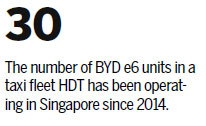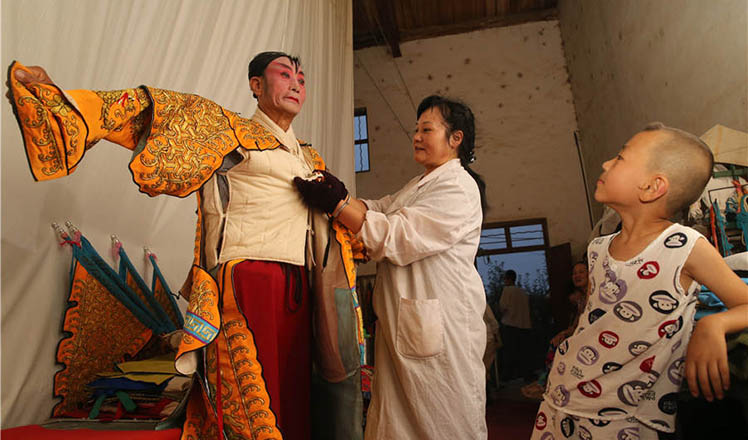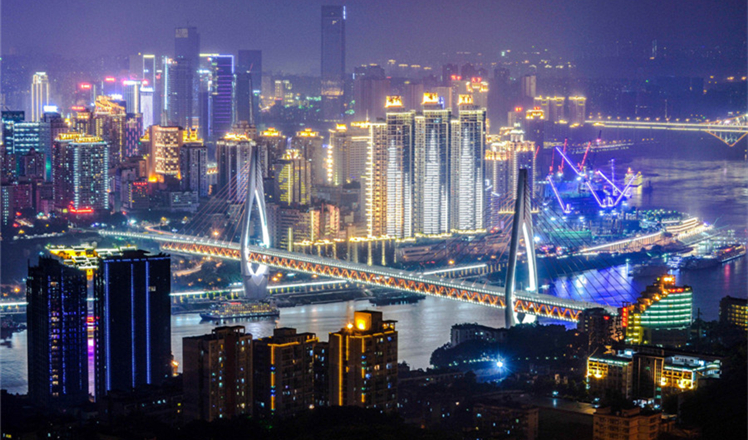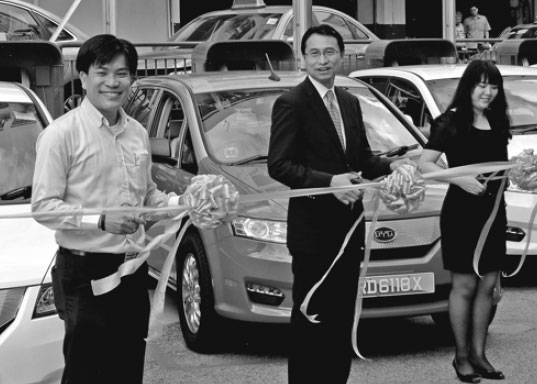BYD's EVs set to green Singapore
Updated: 2016-08-22 07:43
By Du Xiaoying(China Daily USA)
|
|||||||||
A six-month trial of electric bus K9 begins; success could mean opportunities in the region
China's major electric vehicle or EV producer BYD Co Ltd is targeting Singapore to sell buses and taxis. It is relying on its time-tested overseas expansion strategy for the foray.
Promotion of electric vehicles for local public transport systems, and then localization involving establishment of research and development centers or assembly lines - they constitute BYD's strategy to enter a foreign market.
The carmaker announced on Aug 8 that it would conduct trials of its pure electric bus K9 in Singapore from this month. The six-month trials will see the K9 being introduced into Go Ahead SG's bus services operating from Loyang Depot.
The trials will look into the challenges of whether an electric bus can meet the full-day operational demands of a conventional public bus, without compromising on reliability and serviceability, in a local environment.
It is also part of Singapore's EV Phase 2 Test, a trial program of the Land Transport Authority and the Economic Development Board to research and develop EVs.
The program is aimed at exploring fleet-based operations such as electric car-sharing, electric buses and electric taxi fleets, and assessing whether they are viable for Singapore's land transport network.
"BYD is committed to providing green and sustainable comprehensive ground transportation including e-buses, e-taxis, e-vans, as well as e-trucks," said Liu Xueliang, BYD's general manager for the Asia-Pacific region.
Currently, Singapore uses buses with internal combustion engines fueled by diesel. There are about 18,000 public and private buses in service in Singapore, accounting for about 2 percent of the total vehicles on the country's road.
Last month, BYD also signed a purchasing contract of 100 units of e6 pure electric crossover sedans with a local taxi firm HDT Singapore Taxi Pte Ltd, marking BYD's first fully electric taxi operation in Southeast Asia.
HDT will begin its e6 taxi service in the first week of September, with all 100 units being progressively introduced until the first quarter of 2017, the e-carmaker said.
HDT has been operating a private-hire service with an existing fleet of 30 BYD e6 units since 2014, which will continue to provide on-call and leasing services.

HDT's e-taxi trial is also part of Singapore's EV Phase 2 Test. The HDT e-taxi service will operate for eight years.
"With its strong research capabilities, great pool of talent and a growing electro-mobility ecosystem, Singapore is an ideal location to deploy our e-taxi fleet to conduct research and development with reputable partners," said Wang Chuanfu, chairman of BYD Group.
Wang said he hopes to co-create new and innovative solutions that can be commercialized first in Singapore and later in other countries in the region.
Seeing Singapore's leading position in finance, technology, culture, and its location in Southeast Asia, as well as strong commitment to environmental preservation, BYD considers the country a key market in the region.
The e-carmaker said it plans to establish its Southeast Asian regional headquarters and research and development center in Singapore, but did not indicate a time frame.
"It depends on the market, so we can't decide when to build them," said a public relations executive of BYD, adding the company now is discussing the idea with the Singaporean government.
Singapore issues a limited number of vehicle licenses every year and applicants could get one in a bi-weekly auction. The license price varies according to vehicle emissions and type.
"In Singapore, buying a vehicle is like buying a house, it is too expensive", said Amanda Hao, 33, a Singaporean resident, who is curious why the government seems not very active on encouraging new energy vehicles or NEVs.
According to her, a license for vehicles with engines under 1600cc costs about $37,600, while a license for vehicles with engines above 1600cc would cost about $42,100. But licenses for vans and buses are cheaper at $33,800.
Founded in 1995 as a battery maker, BYD is now a new energy solution provider with businesses covering four industries: IT, cars, new-energy vehicles and light rail systems.
Listed on both the Hong Kong bourse and the Shenzhen Stock Exchange, BYD said it aims to sell 150,000 NEVs worldwide this year. Last year, it sold 70,000 NEVs across the world, up more than 200 percent year-on-year.
The company has 24 production bases in China, one in the United States and one in Brazil. Its NEVs have been sold in 48 countries and regions.
duxiaoying1@chinadaily.com.cn
|
Representatives of BYD Co Ltd and HDT Singapore Taxi Pte Ltd attend a BYD's e-car taxi launch ceremony at HDT's electric car charging station in Singapore. Provided to China Daily |
(China Daily USA 08/22/2016 page14)

 Goodbye, Rio; hello, Tokyo
Goodbye, Rio; hello, Tokyo
 The world in photos: Aug 15- Aug 21
The world in photos: Aug 15- Aug 21
 Kickboxing and throwing punches: Welcome to flight security training
Kickboxing and throwing punches: Welcome to flight security training
 Qinqiang Opera actors brave heat to bring smile to faces
Qinqiang Opera actors brave heat to bring smile to faces
 Top 10 cities with highest GDP in H1
Top 10 cities with highest GDP in H1
 Chinese teenagers take gold, silver on 10m platform
Chinese teenagers take gold, silver on 10m platform
 US granted re-run to send China out of relay race
US granted re-run to send China out of relay race
 China inches toward gold after beating Netherlands
China inches toward gold after beating Netherlands
Most Viewed
Editor's Picks

|

|

|

|

|

|
Today's Top News
Trump outlines anti-terror plan, proposing extreme vetting for immigrants
Phelps puts spotlight on cupping
US launches airstrikes against IS targets in Libya's Sirte
Ministry slams US-Korean THAAD deployment
Two police officers shot at protest in Dallas
Abe's blame game reveals his policies failing to get results
Ending wildlife trafficking must be policy priority in Asia
Effects of supply-side reform take time to be seen
US Weekly

|

|










